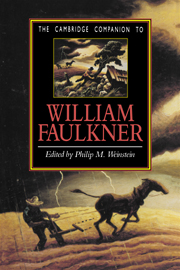Conclusion
The Stakes of Reading Faulkner - Discerning Reading
Published online by Cambridge University Press: 28 May 2006
Summary
As I write, we approach the hundredth anniversary of William Faulkner’s birth, and the turn of a century and a millennium. Considering the advances and promise of this past century, we may look forward to beginning a new era. Seeking lessons from this century’s failures, we may meditate on a period that has been, despite all its real advances, murderous on a scale beyond precedent and perhaps beyond comprehension. This century has witnessed, and continues to witness, the violent destruction of unnumbered millions of people and a ravaging of the earth we're only now beginning to reckon. At this point in a hundred years of awesome accomplishment and promise coupled with sickening destruction, it seems appropriate to ask some questions here about reading a famous literary record of this time.
What’s at stake in reading Faulkner? To whom does it matter? Why does it matter?
Or, why ask why? These questions may seem to be unnecessary or to answer themselves. On the one hand, it is well known that Faukner matters, and has mattered, to many readers. The preceding esssays in this volume testify to, even as they critically examine, Faulkner’s importance for an international reading public.
- Type
- Chapter
- Information
- The Cambridge Companion to William Faulkner , pp. 197 - 220Publisher: Cambridge University PressPrint publication year: 1995

